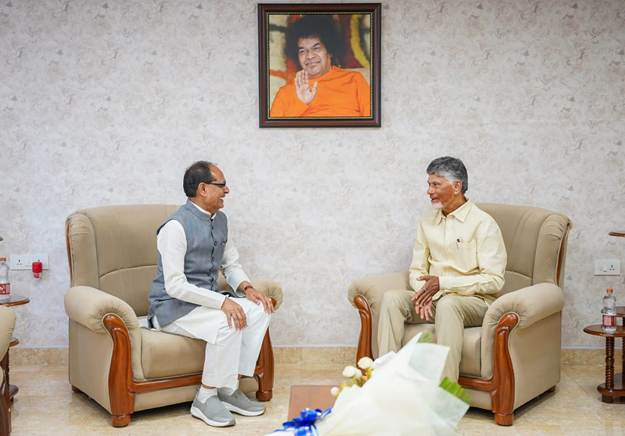Centre and Andhra Pradesh Forge Joint Action Plan for Drought Relief and Agricultural Revival
The Union Minister acknowledged the plight of the local farmers, attributing their suffering to irregular monsoons and inefficient use of previous central funds.

- Country:
- India
In a crucial high-level meeting held at the PGRS Hall of the District Collectorate in Puttaparthi, Sri Sathya Sai district, Union Agriculture Minister Shri Shivraj Singh Chouhan engaged with senior ministers and officials from the Andhra Pradesh government to review the severe drought situation in the southern districts of the state. The dialogue centered on immediate relief efforts, long-term agricultural resilience, and the strategic advancement of organic farming and the National Palm Oil Mission in the region.
Addressing Drought in Rayalaseema: A Joint Priority
The Rayalaseema region, historically prone to arid conditions, has been reeling under recurrent droughts and water scarcity. The Union Minister acknowledged the plight of the local farmers, attributing their suffering to irregular monsoons and inefficient use of previous central funds. “This region faces specific challenges — low rainfall and frequent droughts, which put farming and farmers in distress,” Shri Shivraj Singh stated during his media interaction.
He also lauded the proactive measures being initiated under the new state leadership, emphasizing that “under the visionary leadership of Hon'ble Chief Minister Shri Chandrababu Naidu, the Andhra Pradesh government has taken several significant steps — from promoting drip irrigation to boosting horticulture.”
Correcting the Course: From Fund Diversion to Farmer-Centric Governance
The Union Minister did not shy away from pointing out mismanagement by the previous regime, accusing it of diverting central funds, thereby worsening the agrarian crisis. “The previous government diverted central funds, which was gravely unjust to the farmers. But the current government is actively working towards changing that,” he said, while expressing satisfaction with the present government’s transparent and result-oriented approach.
Shri Chouhan emphasized the importance of formulating a dual-track strategy — with short-term and long-term components — to combat the drought and rejuvenate farming practices. Both state and central governments agreed to jointly develop an Integrated Action Plan for the affected districts.
Deployment of Central Expert Teams
One of the key decisions taken during the meeting was the immediate deployment of a central team of experts to Andhra Pradesh. This task force will comprise:
-
Scientists from the Indian Council of Agricultural Research (ICAR)
-
Officials from the Ministries of Agriculture, Rural Development, and Land Resources
-
Specialists in Watershed Management and Climate-Resilient Agriculture
Their mandate will be to assess on-ground conditions, consult with local farmers and officials, and formulate actionable recommendations for crop cultivation even under persistent drought conditions.
Emphasis on Integrated and Sustainable Farming Models
A major thrust of the discussion was the adoption of Integrated Farming Systems (IFS) as a sustainable model for drought-affected districts. These systems aim to diversify income sources and minimize climate risk. The components of IFS include:
-
Horticulture (fruits, vegetables, flowers)
-
Agroforestry
-
Beekeeping
-
Animal husbandry (dairy, poultry, sheep, and goat rearing)
Shri Chouhan noted that “integrated farming offers farmers income stability, employment security, and higher resilience against environmental uncertainties.”
Additionally, research and development of drought-resistant seed varieties was also declared a priority, with ICAR expected to lead the initiative. Such varieties would help ensure reliable yields even in low-rainfall regions.
Water Resource Solutions on the Horizon
The Union Minister highlighted that water resource augmentation would be a parallel priority. The Ministry of Jal Shakti will be engaged to explore the feasibility of diverting water from the Krishna and Tungabhadra rivers to drought-hit regions of Rayalaseema through a mix of rainwater harvesting systems, micro-irrigation projects, and canal linkages.
Afforestation drives and landscape restoration were also discussed as long-term ecological buffers against aridification.
Boosting Organic Farming and Palm Oil Production
Beyond drought relief, the discussions extended to advancing organic farming and boosting domestic palm oil production — two areas with both environmental and economic benefits. Andhra Pradesh has been identified as a potential hub for palm oil cultivation, and collaboration with the National Mission on Edible Oils (Oil Palm) was explored as part of the solution matrix.
A Message of Hope for Farmers
Shri Shivraj Singh Chouhan concluded the meeting on an optimistic note:
“We have discussed preparing an Integrated Action Plan, on which we will work together with the state government. I am confident that we will be able to help farmers in the drought-affected districts overcome these challenges.”
The joint commitment of the central and state governments to actionable policies, expert-led planning, and ground-level execution is expected to deliver tangible benefits for Andhra’s farmers in the coming months.










